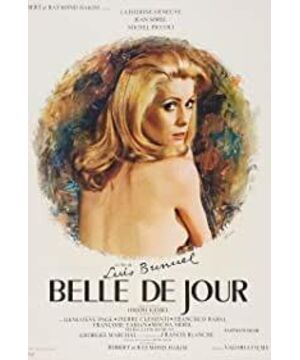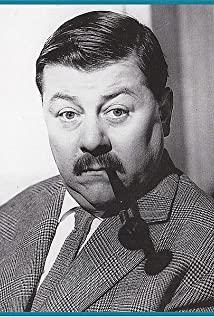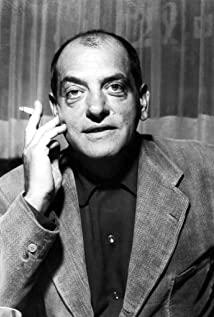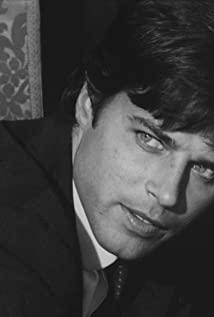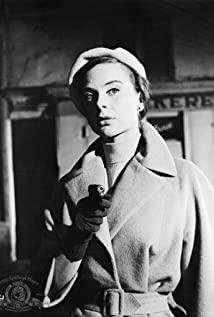The film was adapted from the novel of the same name by Joseph Kessel. The novel published in 1928 caused a wave of criticism and was accused of being a pornographic novel. Luis Buñuel saw the essence of the novel and appreciated its story frame, so he co-written the screenplay with Jean-Claude Carrière, removing some too dramatic The development of the plot makes the theme more clear and critical.
1967 was on the eve of the May Revolution in France in 1968. After the war, the European economy began to recover. Young people eagerly expected to be on the mainstream stage of society. Freedom, especially sexual freedom, became a banner for young people to resist the old social concepts and rules. . Bunuel himself is an anarchist and communist believer. This film breaks through the previous standards, putting sexual fantasies, sexual abuse and other topics that predecessors have not dared to touch on the stage, showing the uncontrollable desires of the flesh, and the distinction between the spirit and the flesh is clearly derogatory.
Catherine Deneuve (Catherine Deneuve) plays a bourgeois young woman, Severina, who leads a carefree life. Her husband is a young and talented doctor who is generous and gentle. It is said that she should be very happy, but with an empty and boring heart, she could not restrain the impulse of the body. She often went to a brothel to prostitution in secret, and lived a pure and clean, secretly adulterous double life. In the end, her other side was seen through by her husband's friend, and the young robber who was in full possession of her shot her husband, and the friend confessed everything to the paralyzed husband.
Fantasy scenes are interspersed many times in the movie. (1) In the autumn forest, the rough husband on the carriage instructed the coachman to insult, whipped and tortured Severina because of a discord. (2) After being lured by her husband's friends, she flashed through scenes of being molested as a child. When walking up the stairs of the brothel and deciding to take that step, she inserted into the church to receive the sacrament. Little Severina shook her head at the bread that the priest handed and closed her mouth tightly. In her childhood, she had doubts about purity. (3) After the first prostitution, she went home and burned her underwear in the stove, and lied to her husband. I imagined that her husband and friends were grazing cattle on the mountain, the evening bell rang, and the friends prayed silently, and then the two used mud to filth the hands and feet of Severina who were bound together. This brought her the satisfaction of being abused. (4) A friend once went to her house to find her, but she refused to see her. When she turned back, she imagined that they were in the coffee shop on the ski resort together. She and her friend went under the table, while the husband and the friend's girlfriend were calm. This satanic man kept tempting her, just to discover her true personality hidden under the appearance of innocence. (5) After her friend broke through her whereabouts, she visited again, and she attributed her depravity to his suggestion. The speculation of a duel in the woods paved the way for the assassination of her husband. (6) At the end, the paralyzed husband learned the truth and suddenly took off his sunglasses and stood up, with a happy and relieved expression. At this time, the bell of the cat called the cow and the horse that had appeared in the movie sounded, and the scene returned to the carriage that was originally traveling on the road of Fontainebleau. These dreamy shots provide a good explanation for the evolution of Severina's personality, and are also the purpose of the film to reveal-the illusory daydream of the bourgeoisie.
Like the masters of his time, Bunuel is good at using long shots to show the trajectory and psychological changes of characters. For example, when Severina is hesitant at the door of the brothel, the camera follows her from far and near, advances, walks away a little, and then quickly slips away from the door. When he returned there again, he was determined, so he quickly entered the door. The actor does not need too many body movements and expressions, just use the language of the lens to express the mentality very delicately. In the final stage of the film, after a friend told her husband the truth, Severina returned to her room nervously. The camera shot her looking at her husband, making a circle in a distance, turning from the front to the back and then to the side, before slowly sitting opposite her husband. The uneasy feeling of being a guilty conscience is clear at a glance, and the technique is more subtle than thousands of words.
Severina's clothing also played a role in setting off the psychology and promoting the plot. As a pampered young woman of the middle class, her clothes are authentic and tailored high-end ready-to-fit garments. Wear white when playing tennis, like a lily, youthful and pure. Later, when I went to the brothel, I wore a black suit, a black hat and sunglasses, which symbolized the panic and depression in my heart. After her husband was paralyzed, she concentrated on taking care of him, stopped leaving the house, and dressed restrained. When a friend came to visit, she said she was dressed like a precocious female student. And one of her customers, the young criminal, although lavish, but exaggerated, wearing a pair of rotten socks with big holes in shiny leather boots. Point out the details of his nouveau riche and desperadoes.
I really hate the non-stop background music in some movies, which makes people's minds bloated. There is no music at all in this film, at most only some wind, the rustle of leaves, several meows, the sound of horseshoes and bells, and the sound of old grandfather clocks. Every time it sounds, it plays a psychological role in the development of the plot, and it is just right to cherish the ink like gold. The audience's attention is always only attracted by the subject, close to the heart of the character, without unnecessary interruption.
I really appreciate the dialogues in Bunuel's movies, they always give me great enjoyment. The reason why he prefers his films in the French period is also because he can directly view the original version of the language, and can better appreciate the charm of the language, without translation, and less misunderstanding. I like the unhurried and unhurried tone of the people in the play, typical of the educated class. The dialogue is extremely in line with the identity of the character. The bourgeoisie has the elegant and hypocritical speech of the bourgeoisie, the nouveau riche can hardly change the vulgar tone of the nouveau riche, and the common people have the saying that the common people do not get on the stage. Meetings of all classes are always humorous. Bunuel humbly said that he was not good at writing, so he often asked some writers to write his lines specifically. I think domestic directors can learn from it. If they can’t write a script, they can humbly ask someone to write it. It is better than a script written with shit and unreasonable. You can't always treat the audience as mentally handicapped, thinking that saying a few unliterate words is elegant.
Catherine Deneuve's performance was remarkable, she got rid of the cool blonde vase image in one fell swoop. The demon-like friend is Michel Piccoli (Michel Piccoli). The acting is so good that he looks like a middle-aged Satan, so he almost got an apple, or he would really become the seduced Eve. The snake.
This film is always the title of a masterpiece of erotic movies, which I don't think is exactly the case. All the erotic scenes are carried out in a very subtle way, and there is no naked description. If you want to watch porn, you will not be satisfied. It is more about psychological description and psychological analysis, which can be used to annotate the image of "Analysis of Dreams". The masterpiece is affirmative, but this is a masterpiece of a psychological film.
View more about Belle de Jour reviews


